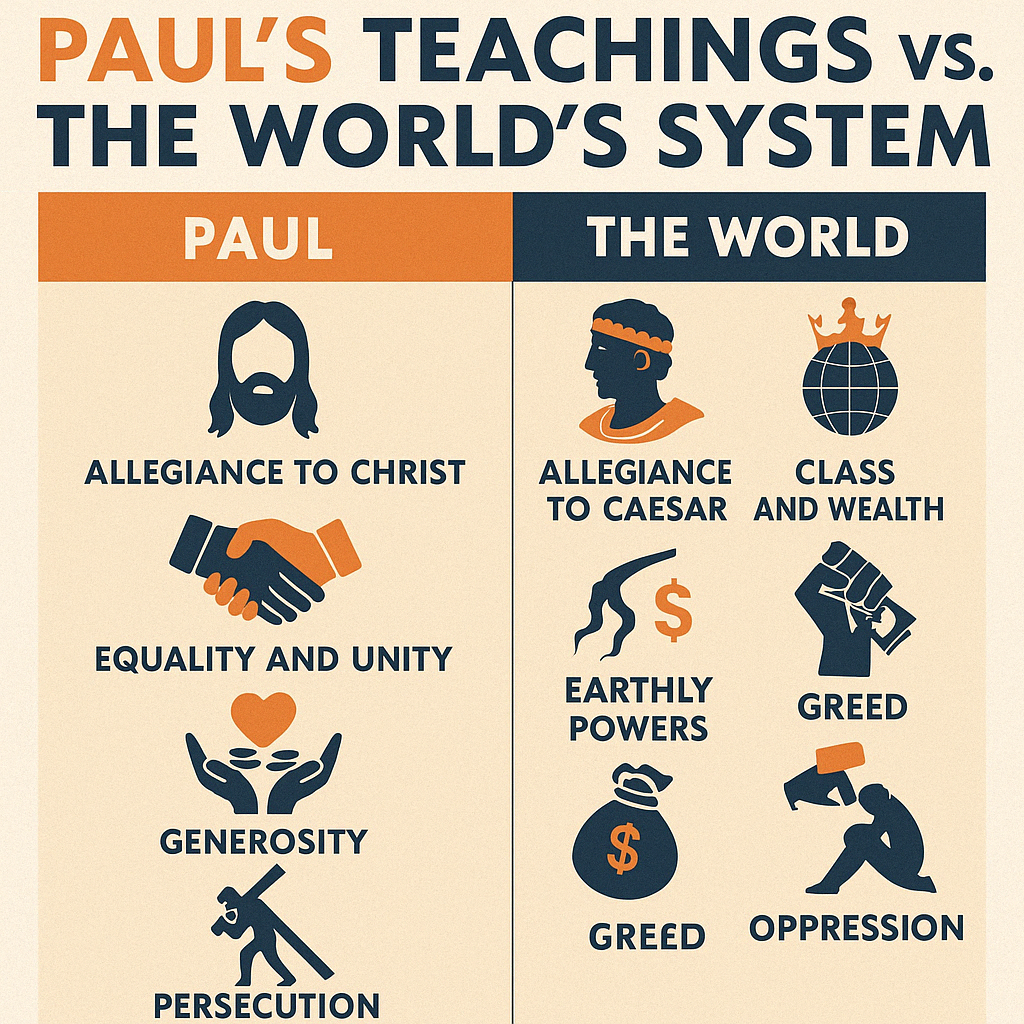Context: The World Paul Entered After His Conversion
When Saul of Tarsus — later known as Paul — experienced his dramatic conversion on the road to Damascus (Acts 9), he stepped into a hostile and complex world:
- Roman Imperialism: Rome controlled much of the known world, enforcing a strict order of commerce, taxation, and political allegiance to Caesar. The empire was upheld by military might, economic exploitation, and a rigid hierarchy.
- Hellenistic Culture: Greek philosophy and values had deeply permeated Jewish society, stressing individualism, human reasoning, and material prosperity.
- Jewish Elitism: The religious authorities — the Pharisees, Sadducees, and temple priesthood — were deeply entangled with Roman political powers. Many had abandoned the spirit of the Law for institutionalized control, commerce around the temple, and self-preservation.
- Economic Inequality: The wealthy elites, including Herod’s court, Roman governors, and merchant classes, accumulated vast fortunes, while peasants lived under crushing taxation and debt.
Thus, when Paul began teaching “The Way” — the radical message of Christ — he wasn’t merely preaching a new personal spirituality.
He was declaring war against the world’s system of power, commerce, and corruption.
Paul’s Core Teachings: A New Culture for a New Kingdom
Paul taught a completely countercultural, revolutionary way of life, calling people to reject the corrupt systems of the world:
Allegiance to Christ Alone (Not Caesar or Commerce)
“Jesus is Lord” (Romans 10:9) was not just a private faith statement — it was a political declaration.
At the time, “Caesar is Lord” was the imperial creed.
Paul called believers to submit their ultimate loyalty not to emperors, markets, or temples — but to Christ alone, undermining Rome’s core structure.
- New allegiance: to God’s Kingdom, not to the empire.
- Freedom: from the fear-based systems of Roman commerce, debt, and servitude.
The End of Class and Wealth Distinctions
Paul preached the radical equality of all people:
“There is neither Jew nor Greek, slave nor free, male nor female, for you are all one in Christ Jesus.” (Galatians 3:28)
In a world built on elite privilege and merchant wealth, Paul taught:
- The abolition of class structures.
- The rejection of exploitation and usury.
- Redistribution through generosity — the early church practiced sharing everything in common (Acts 2:44–45).
He proposed an economy based on trust, sharing, and love, rather than greed, debt, and oppression.
A Spiritual Warfare Against the “Principalities and Powers”
Paul’s letters reveal he understood that behind commerce, politics, and empire lay spiritual forces of darkness:
“For we wrestle not against flesh and blood, but against principalities, against powers, against the rulers of the darkness of this world…” (Ephesians 6:12)
- The “powers” were not just demons — they included corrupt political, economic, and religious institutions.
- Christ’s death and resurrection disarmed these powers (Colossians 2:15).
Thus, following Christ meant **waging spiritual war against the systems propped up by greed, manipulation, and violence.
A New Economy of Generosity and Service
Paul redefined success:
- Not wealth or status, but service, humility, and sacrifice.
- He urged radical generosity toward the poor (1 Corinthians 16:1-3, 2 Corinthians 8–9).
- He called out false teachers who were “peddling the Word of God for profit” (2 Corinthians 2:17).
In a commerce-obsessed world, Paul taught a relational economy — based on love, care, and freely given gifts, not transactions.
Endurance Through Persecution and Death
Paul knew that teaching this countercultural message would provoke violent resistance:
- He was imprisoned multiple times.
- He was beaten, stoned, shipwrecked, and ultimately executed by the Roman state (2 Timothy 4:6-8).
His life embodied “the Way” — a path of suffering love that exposed and resisted the corrupt systems of the world.
He warned the churches constantly:
“Everyone who wants to live a godly life in Christ Jesus will be persecuted.” (2 Timothy 3:12)
Specific Examples Where Paul Confronted the Commerce and Elite Systems
| Event | Description | Result |
|---|---|---|
| Confrontation at Ephesus (Acts 19:23-41) | Paul’s teachings threatened the business of the silversmiths who made idols of Artemis. A full-blown riot broke out. | Economic loss led to violent backlash. |
| Refusal to Compromise with Judaizers | Jewish Christians wanted Gentiles to be circumcised and follow temple rituals (which sustained temple commerce). Paul refused, emphasizing faith alone. | Preservation of spiritual freedom over religious-commercial systems. |
| Denouncing Greedy False Teachers | Paul warned against those who used religion for profit. | Advocated pure motivation in ministry, not commerce-driven corruption. |
Why Paul Was So Dangerous to the System
- He undermined economic interests.
The temple commerce systems, Roman tax collection, and wealthy merchant classes all lost power if people followed Paul’s way of life. - He defied political loyalty.
Calling Christ “Lord” was treason against Rome. - He exposed hidden systems.
By talking about the “powers,” he revealed that worldly structures were tools of invisible evil. - He united enemies.
Jews, Greeks, slaves, women, soldiers — all could be brothers and sisters.
This shattered social and economic hierarchies necessary to maintain empire.
Thus, Paul’s teachings were not only spiritual but radically political, economic, and cultural, leading to his eventual martyrdom.
Conclusion: Paul’s Way vs. The World’s Way
Paul wasn’t merely founding churches —
he was founding a new civilization:
- One based on trust, truth, service, and freedom,
- Standing opposed to debt, fear, manipulation, and violence.
In the clash between the Kingdom of God and the kingdom of commerce and empire, Paul stood fearless, showing that true power is not found in gold or thrones, but in the self-giving love of Christ.
His words, legacy, and martyrdom remain a powerful challenge to every age enslaved by the worship of wealth, control, and commerce.
“Do not conform to the pattern of this world, but be transformed by the renewing of your mind…” (Romans 12:2)






